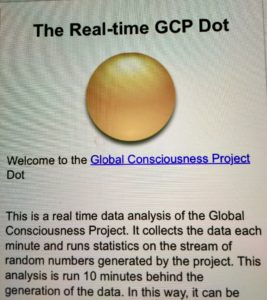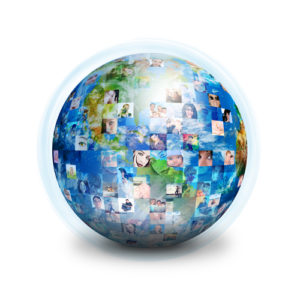I’m slightly obsessed with science and technology TV shows (How The Earth Works, Through The Wormhole, etc.). In fiction, I love Michael Crichton-style techno/sci-fi thrillers, such as stories about a new technology run amok (JURASSIC PARK and PREY, for example). So I was intrigued by a story I recently heard about a worldwide research effort called The Global Consciousness Project. The research project (which is being conducted at Princeton University) is collecting data to investigate the theory that a global, coherent consciousness exists, composed of the energy created by human minds.
Up until recently, any notion of a global consciousness existed only in the realm of science fiction novels and B movies. But according to the project’s researchers, recent studies have suggested that the presence of humans (specifically, human minds) can in fact have a discernible effect on random number, machine generated data. I’m probably not explaining the concept well, so below is a YouTube video with more information. But basically, the idea is that human thoughts and reactions to significant events, scaled up to a global level, creates measurable impacts on patterns of otherwise random data. The researchers are tracking the changes in “thought energy” by tracking realtime color changes in a so-called “Global Consciousness Project Dot.” The dot changes color every time there is a structured change in an otherwise random data pattern. In other words, the Global Dot is supposed to function as a sort of planetary Mood Ring. (Remember those?)
When I checked the Global Dot this morning, it was Orange, which suggests people are responding to some significant event taking place in the world. (Did I miss something big?)
So, getting back to science fiction and technology run amok: in the hands of a novelist, how might the theory behind the Global Consciousness Project be helpful or harmful to humanity? To be the stuff of a good sci-fi story, the technology or science must appear promising at first (as the Global Consciousness researchers declare this project to be), but then–talking strictly fiction here, I’m not impugning the actual GCP itself in any way–that technology has to morph or change in some unanticipated way, becoming a monster that threatens humanity instead of helping it.
If you were to write a sci-fi novel based on the science of The Global Consciousness Project, how would you turn it into a “monster” for your thriller?



“The research project is collecting data to investigate the theory that a coherent consciousness exists, composed of the energy created by human minds.”
…except in Washington D.C.
Sorry, couldn’t resist. Seriously, what an interesting concept. Wonder if anyone has written a novel using it. If not, I can guess someone is in the process. 🙂
Lol, probably Washington’s “brains” aren’t helping the project too much, Kris! I can imagine a group of “mind hackers”, kind of like a mental Wikileaks, focusing its group’s energy to cause havoc with networked systems, or threatening to crash planes (or perhaps just crashing them as a sudden terrorist strike). Since they’re scattered around the globe and using only their thoughts to cause havoc, the “good guys” would have to scramble to fight back.
I don’t write sci-fi, so this may be cliché:
I’d make the usefulness of the dot devolve as the story progresses, as its capabilities become less scientifically reflective and more indicative of human shortcomings.
First, the creation phase: the dot color announces big changes or events as they occur. Next, the potential-maximization phase: the dot color predicts big changes before they occur, allowing time for humans to reap the advantages of positive events and mitigate the effects of negative events. Next, the fractured phase: the dot color intermittently exhibits confusion—maybe it rapidly wavers between two or more colors, or assumes muddied colors, or turns a color not on the chart. Finally, the deceptive phase: the dot color sometimes turns the wrong color, it can’t be trusted.
I love those ideas, TL! Speaking of premonitions, I forgot to mention the fact that on September 11th 2001, the energy patterns changed several hours BEFORE the airplane attacks on NYC and Washington, suggesting the possibility of some sort of premonition aspect to the global consciousness. So I think I’ll “check in” with the dot before I take my next flight. ?
“…I forgot to mention the fact that on September 11th 2001, the energy patterns changed several hours BEFORE the airplane attacks on NYC and Washington…”
Ooh, creepy.
I love the idea of an emerging consciousness from a collective of minds. I can think of several story lines.
From a biology perspective, each human mind could be like a neuron in an individual brain, with the interactions giving rise to a higher consciousness than the individual mind/neuron. Maybe the “super-intelligence” becomes sentient after a critical mass of human minds? It recognizes that the health of the whole is compromised by the overall actions of the many and begins to manipulate our world in some way to save and improve itself? Maybe all the great scientists through history were “gifted” their great ideas from the great consciousness?
The book, “Nonzero: The logic of human destiny” touches on an arrow driving human destiny, possibly this Global Consciousness is driving it?
Or maybe it is completely unaware of us, and it is its actions that drive the self-destructive nature of humans? A bicameral mind with a “good” and an “evil” part battling to control humans(warning, horror theme)!
Or maybe it has always been there and forms the basis of spirituality and unexplained events in our history?
Just a couple of thoughts!
I just hope the Global Mind (if there’s anything to the theory) eventually adds value to the human experience. Thanks for joining in today, Scott!
The time to believe something comes when evidence surfaces. As of now, there is no evidence for the notion of a human global consciousness, nor evidence that consciousness is anything else than an emergent property of a physical brain.
One should remain open-minded, though.
That, of course, is a core tenet of the scientific method, which has proven to be the most successful epistemological tool in human history, by leaps and bounds.
I reckon it’d be an interesting premise for a sic fi novel. The author would have to explain why reality seems to behave in a way that is seemingly congruent with the non-existence of such a thing.
Why hasn’t this great consciousness gifted us with a cure for cancer? Why hasn’t it decided that it’s time to end, once and for all hunger, illiteracy, poverty, rape, etc.? Imagine if the alleged global consciousness had bothered to inform vast legions of people that it’s not really decent to stone people, to burn them alive, to bomb innocents, that it’s not wise to guide one’s life by what some bronze age, probably well-meaning, folks have written eons ago in holy books that have now become blindly revered. Imagine that.
I guess the author would really have to confront that global consciousness.
“What the f**k have you been doing all these millennia, hey? Watching Netflix, eating French and burping Dr. Pepper?”
Anyway, that’s how I would approach it.
I’d worry that confronting the Global Consciousness might make it cranky, but worth a try, NR!
Interesting but not surprising. Back in the 80s, I wrote a paper for a college psych class about ‘action at a distance’ and how some things fall outside our current scientific ability to measure or explain. The example I used was a properly conducted blind study of eight hospital patients in for heart surgery. The group was split in two, with the hospital staff in the dark about which group each patient was in. The anonymous photos of members of the test group were handed off to a prayer group that had no knowledge of what the circumstances of the patients were. The prayer group prayed for these people they didn’t know or ever communicate with. At some point post surgery, the group who had been prayed for showed measurably better medical outcomes than those who hadn’t been prayed for. I put this forward not as an example of the power of religion, but rather as an example of power of the mind, the same thing that your study is investigating.
As to fiction, the potential is unlimited. Do some individuals have more power than others to affect outcomes? Is it their direct power, or is it their ability to get others to think the same way they do so that the belief group grows? Is it possible to assemble a particularly powerful group and assassinate from a distance? Instead of investing in advertising and lobbyists, should corporations invest in their own versions of ‘prayer groups’ to influence customer buying habits or to sway legislators to vote for deregulation? Loads of possibilities for stories.
Kathy
I guess the Global Consciousness would have a lot of ‘splaining to do, lol! Thanks for dropping in today!
Watching the dot graph kind of makes me want to dig into world news and see what was happening while the graph was orange. Hmm. Very interesting.
The only thing I found at that moment was that the PM of The UK called for a General Election, quite unexpectedly. Maybe it was that? ?
So here’s my “what if”:
At first, the Dodoes what it’s doing,
…but what if the researchers notice a dawning ” consciousness” within the Dot…
…and then, what if, the Dot begins reversing the “flow”, influencing the emotional world state before taking over…
The protag(s) of course are wearing tin foil hats and therefore can’t be reverse influenced…
Not an elevator pitch, but…
And the title would be, LAST STAND OF THE TIN BERETS, or something like that–love it George!
I think this is fascinating! Dan Brown’s The Lost Symbol is about the Noetic Sciences, which has a lot to do with the collective power of human consciousness and explores things like group prayer, remote viewing and weight/mass of souls (or consciousness).
I was talking to a friend yesterday about Noetic Sciences, and I want to learn more about it. Thanks for visiting us today, Angie!
Fascinating blog, Kathryn. I’m wondering if there have been any major changes since the US Presidential election, which seems to have unleashed a great deal of positive and negative emotion.
They have links to the data captured during various major events, including elections, tragedies, and also uplifting events. The data for 9/11 was by far the most interesting and dramatic, I thought. If ever there was an event that sparked a global emotional reaction, that was it.